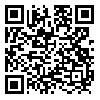جلد 5، شماره 2 - ( پاییز و زمستان 1403 )
جلد 5 شماره 2 صفحات 236-203 |
برگشت به فهرست نسخه ها
Download citation:
BibTeX | RIS | EndNote | Medlars | ProCite | Reference Manager | RefWorks
Send citation to:



BibTeX | RIS | EndNote | Medlars | ProCite | Reference Manager | RefWorks
Send citation to:
Emdadi Masuleh M, Peik Herfeh S, Hesamifar A, Ebadi A. Islamic Theism and Transhumanism. پژوهش های مابعدالطبیعی 2024; 5 (2) :203-236
URL: http://mi.khu.ac.ir/article-1-302-fa.html
URL: http://mi.khu.ac.ir/article-1-302-fa.html
امدادی ماسوله محمد، پیک حرفه شیرزاد، حسامی فر عبدالرزّاق، عبادی احمد. خداباوری اسلامی و فراانسانگرایی. پژوهش های مابعدالطبیعی. 1403; 5 (2) :203-236
1- گروه فلسفه، دانشگاه بینالمللی امام خمینی(ره)،
2- دانشگاه بین المللی امام خمینی(ره) ،shirzad.peik@hum.ikiu.ac.ir
3- دانشگاه بین المللی امام خمینی(ره)
4- دانشگاه اصفهان
2- دانشگاه بین المللی امام خمینی(ره) ،
3- دانشگاه بین المللی امام خمینی(ره)
4- دانشگاه اصفهان
چکیده: (2041 مشاهده)
در دهۀ اخیر، گفتگو میان علم و دین وارد عرصۀ جدیدی شده و پیدایش فناوریهای نوظهور بر پیچیدگیِ تعاملات علم و دین افزوده است. در مباحث پیشینِ علم و دین دستکم بر محدودیتهای زیستی و شناختیِ (عملکرد ادراک و حافظۀ) انسان همواره تأکید میشد، اما جنبش فراانسانگرایی درصدد است این محدودیتها را بهمنظور رساندنِ انسان به مرحلۀ پساانسان برطرف کند. فراانسانگرایی یک جنبش علمی، فناورانه، فلسفی و فرهنگی است که در تلاش است بر محدودیتهای زیستیِ انسان (مانند بیماری، پیری و مرگ) غلبه کند و ویژگیهای فیزیکی، عاطفی و فکری انسانها، همانند ظرفیتهای بدنی، هوشی و اخلاقی را تقویت کند. پیشرفتهای بیسابقه در زیستمهندسی، زیستفناوری، نانوفناوری و زیستپزشکی، که میتوانند زندگی افراد مبتلا به بیماری و آسیبهای ناتوانکننده را بهبود بخشند، قادر خواهند بود بهعنوان سنگ بنایی برای فناوریهایی باشند که میتوانند انسانها را ارتقاء بخشند و ماهیتش را تغییر دهند. این نکته نگرانیها را درباره نحوۀ سوء استفاده از فناوریهای نوظهور افزایش میدهد. پرسش اصلیِ پژوهش حاضر این است که توان و ظرفیت اندیشۀ اسلامی در سه مسألۀ خلقت، ساحت وجودی انسان و کیفیت آفرینش الهی در مواجهه با جنبش فراانسانگرایی چیست؟ نظریۀ خلق مدام و مداخلات اصلاحی بهمنظور بهبود شرایط انسانی بهشرط پایبندی به اصل ممنوعیت ضرر در اسلام را میتوان از مزیت-های فراانسانگرایی دانست. باوجوداین، یافتهها با روش توصیفی-تحلیلی نشان میدهد که مبانی تفکر اسلامی و فراانسانگرایی در سه مسألۀ مذکور همخوانی ندارند.
نوع مطالعه: مقاله پژوهشی |
موضوع مقاله:
فلسفی
فهرست منابع
1. قرآن کریم، ترجمۀ محمدمهدی فولادوند.
2. آدامز، ر. ام (1399)، «فلسفۀ دین»، در دانشنامۀ فلسفۀ دین، ویراستۀ پل ادواردز، ترجمۀ انشاالله رحمتی، تهران: سوفیا.
3. ترودی لاجیمی، عابدین؛ محمد هادی یداللّهپور و رضا کهساری (1397)، روح انسانی از دیدگاه قرآن، فصلنامۀ مطالعات قرآنی، 37(4)، 149-123.
4. تمیمی آمدی، عبدالواحد بن محمد (1395)، غرر الحکم و درر الکلم، قم: موسسه فرهنگی دارالحدیث.
5. حسنزاده، صالح (1395)، حقیقت نفس و روح در قرآن و حکمت اسلامی، پژوهشنامۀ معارف قرآنی، 25(3)، 82-82.
6. طباطبایی، محمدحسین (1374)، تفسیر المیزان، قم: دفتر انتشارات اسلامی.
7. قربانی سیسخت، خدیجه و محمدحسن کریمی (1401)، سیر تطور تراانسانگرایی در تاریخ علم و فلسفه از سدۀ هفدهم تا بیستم، فلسفۀ علم، 12(2)، 236-215.
8. کلینی، محمد بن یعقوب (۱۴۳۰ق.)، الکافی، ج.10، قم: مؤسسه علمی فرهنگی دار الحديث.
9. مطهری، مرتضی (1387)، حرکت و زمان در فلسفۀ اسلامی، ج.1، قم: مؤسسۀ فرهنگی و اطلاعرسانی تبییان.
10. مصباحی جمشید. پرستو (1402)، حیات و ممات انسان معاصر در تلاقی دین و تکنولوژی، فصلنامۀ انتظار موعود، 23(82)، 107-79.
11. مکارم شیرازی، ناصر (1374)، تفسیر نمونه، ج. 12، تهران: دارالکتاب الاسلامیه.
12. Agar, N. (2014), Truly human enhancement: A philosophical defense of limits. MIT Press. [DOI:10.7551/mitpress/9780262026635.001.0001]
13. Ali, S. M. (2024), Muslim, Not Supermuslim: A Critique of Islamicate Transhumanism. Religions, 15(8), 975. [DOI:10.3390/rel15080975]
14. Arvin, G.; Green, B. P., and Peters, T. (Eds.). (2022), Religious transhumanism and its critics. Lexington Books.
15. Barrett, J. L. (2007), Cognitive science of religion: What is it and why is it?. Religion Compass, 1(6): 768-786. [DOI:10.1111/j.1749-8171.2007.00042.x]
16. Bostrom, N. (2014). Superintelligence: paths, dangers, strategies. Oxford University Press.
17. Bostrom, N. (2005), Transhumanist values. Journal of philosophical research, 30(Supplement), 3-14. [DOI:10.5840/jpr_2005_26]
18. Bostrom, N., & Sandberg, A. (2017), The wisdom of nature: an evolutionary heuristic for human enhancement. In Dien Ho (Ed.), Philosophical issues in pharmaceutics: Development, dispensing, and use (pp. 189-219). Springer. [DOI:10.1007/978-94-024-0979-6_12]
19. Bouzenita, A. I. (2018), "The most dangerous idea?" Islamic deliberations on transhumanism. Darulfunun Ilahiyat, 29(2), 201-228. [DOI:10.26650/di.2018.29.2.0031]
20. Buchanan, A. (2019), Ethical issues of human enhancement. Institute for Ethics and Emerging Technologies. access in: https://ieet.org/index.php/tpwiki/human_enhancement.
21. Can, S. (2023), Critique of Transhumanism's Concept of Humans from the Perspective of Islamic Thought. Ilahiyat Studies, 14(1), 107-131. [DOI:10.12730/is.1274636]
22. Fuller, S. (2012), Preparing for life in humanity 2.0. Springer. [DOI:10.1057/9781137277077]
23. Hejazi, S. (2019), 'Humankind. The best of molds'-Islam confronting transhumanism. Sophia, 58(4), 677-688. [DOI:10.1007/s11841-019-00755-7]
24. Henig, Robin M. (2007, March 4), Darwin's God. New York Times. Available online: https://www.nytimes.com/2007/03/04/magazine/04evolution.t.html
25. Huxley, J. (1957), New bottles for new wine. London: Chatto and Windus Publishing.
26. Jackson, R. (2020), Muslim and supermuslim. Springer International Publishing. [DOI:10.1007/978-3-030-37093-0]
27. Kelemen, D. (2003), British and American children's preferences for teleo-functional explanations of the natural world. Cognition, 88(2), 201-221. [DOI:10.1016/S0010-0277(03)00024-6]
28. Lilley, S. J. (2013), Transhumanism and society: The social debate over human enhancement. New York: Springer. [DOI:10.1007/978-94-007-4981-8]
29. Marsh, S. (2018, Jun 1), Neurotechnology, Elon Musk and the goal of human enhancement. The Guardian. Available online: https://www.theguardian.com/technology/2018/jan/01/elon-musk-neurotechnology-human-enhancement-brain-computer-interfaces
30. Mercer, C., & Trothen, T. J. (Eds.). (2014), Religion and transhumanism: The unknown future of human enhancement. Bloomsbury Publishing USA. [DOI:10.5040/9798216007074]
31. Mercer, C., Trothen, T. J., & Cole-Turner, R. (2021), Religion and the technological future: An Introduction to Biohacking, Artiicial Intelligence, and Transhumanism. Cham: Springer International Publishing. [DOI:10.1007/978-3-030-62359-3]
32. More, M. (2013), The philosophy of transhumanism. In Max More and Natasha Vita-More (Eds), The Transhumanist Reader: Classical and Contemporary Essays on the Science, Technology and Philosophy of the Human Future (pp. 3-17), West Sussex UK: Wiley-Blacwell Publishing. [DOI:10.1002/9781118555927.ch1]
33. Miller, T. (2008). Us religious landscape survey religious beliefs and practices: Diverse and politically relevant. Available online: https://www.pewresearch.org/religion/2008/06/01/u-s-religiouslandscape-survey-religious-beliefs-and-practices/
34. Powell, Russell, and Steve Clarke. (2012), Religion as an evolutionary byproduct: A critique of the standard model. British Journal Philosophy of Science, 63(3): 457-486. [DOI:10.1093/bjps/axr035]
35. Jung, D. (2022), Transhumanism and theological anthropology: A theological examination of transhumanism. Neue Zeitschrift für Systematische Theologie und Religionsphilosophie, 64(2), 172-194. [DOI:10.1515/nzsth-2022-0009]
ارسال پیام به نویسنده مسئول
| بازنشر اطلاعات | |
 |
این مقاله تحت شرایط Creative Commons Attribution-NonCommercial 4.0 International License قابل بازنشر است. |











